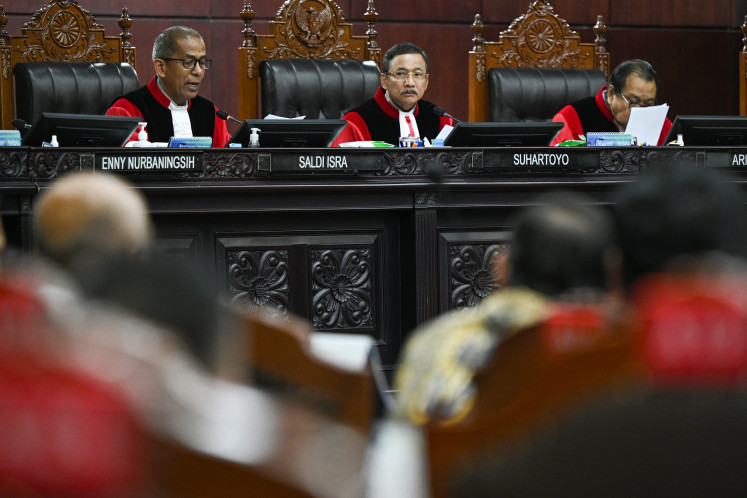Popular Reads
Top Results
Can't find what you're looking for?
View all search resultsPopular Reads
Top Results
Can't find what you're looking for?
View all search resultsEditorial: Positive factors needed
Consumers and businesses are in a subdued mood, as the rupiah seems to have been debased steadily by hidden forces over the past few months
Change text size
Gift Premium Articles
to Anyone
C
onsumers and businesses are in a subdued mood, as the rupiah seems to have been debased steadily by hidden forces over the past few months. The local unit has been languishing between Rp 13,400 and Rp 13,600 to the American dollar.
Several analysts predict, moreover, a further drop to Rp 14,000 later this year, which would be the lowest level since the 1998 economic and political crisis, if no new positive factors buoy market confidence. Most international development agencies have lowered their growth projection for Indonesia to below 5 percent, as against the government target of 5-5.2 percent.
The immediate impact of the steadily weakening rupiah is stronger inflationary pressures as the country depends on imports not only for capital goods and basic industrial materials, but also such basic necessities as fuel, horticultural products, wheat and other food commodities.
Yet more discouraging is the gloomy fact that Bank Indonesia no longer has the ammunition to fire up the weakening rupiah. Raising the BI benchmark interest rate could further depress economic growth, which declined to 4.7 percent in the first quarter, the lowest level since the 2008 global financial crisis.
Lowering the interest rate to stimulate business lending could strengthen the downward pressure on the rupiah as foreign portfolio investors, discouraged by the interest rate differential, may be prompted to unload their rupiah assets. Even now, the mood is toward increased capital outflows in view of the upcoming monetary tightening measures by the US Federal Reserve later this year.
Global economic conditions are likely to remain sluggish, with the European economy expected to contract as the impact of the Greek crisis, and the recovery in the US economy still fragile. As such, we cannot expect any recovery for sluggish exports any time soon, especially because growth in China ' now Indonesia's largest trading partner ' has itself slumped to barely 7 percent from a previous average of more than 9 percent over the past decade.
The fiscal sector is now the only area that can create positive factors to restore confidence in the economic outlook. In the first half, less than 10 percent of the US$20.50 billion investment budget this year was disbursed as senior officials, dreading charges of corruption, hesitate to take any initiatives to accelerate project tendering or implementation.
The government therefore needs to issue the long-awaited presidential decree that has been designed to dispel bureaucratic inertia in budget implementation caused by the excessive risks faced by senior officials in making decisions on projects, contracts and other areas of budget implementation.
The presidential decree will provide a certain degree of discretion for senior officials to make decisions or policies to speed up project tendering or contract negotiations without the risks of facing corruption allegations, as long as the decision-making process is highly accountable and transparent. We need breakthroughs in several stalled high-profile projects to regain market confidence.










